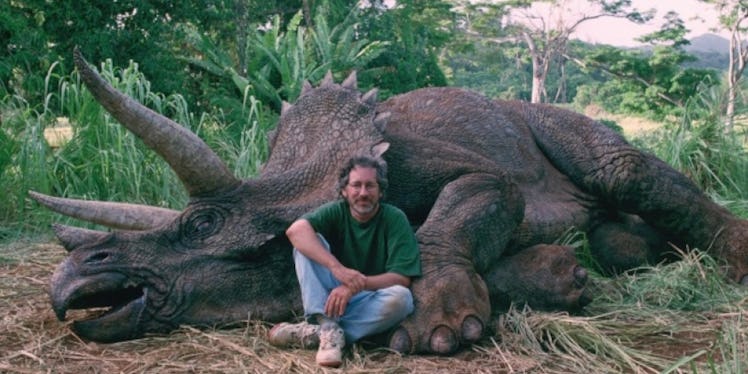Steven Spielberg Gave America a Happier Childhood
A new HBO documentary explores the filmmaker's complicated relationship with his dad and how it influenced his films.

There is no universal experience of the American childhood, but Steven Spielberg always made it seem like there was, or could be, or should be. And then, perhaps ironically and definitely by design, his work became the closest thing Americans had to common cause. E.T., Indiana Jones: Raiders of the Lost Ark, and Jurassic Park were blockbusters in the sense of total cultural domination. Spielberg took theaters and imaginations by force and, in so doing, became a sort of caretaker of American childhood. HBO’s new documentary Spielberg, which tracks the master’s development as a filmmaker and Hollywood power player, posits that the director made himself into the thing he’d wished for back in the Arizona of his youth: a source of comfort that could also inspire.
Unsurprisingly, Spielberg features a silly number of well-known entertainment types upping their main man Steven. Tom Hanks is there, along with Oprah Winfrey, Francis Ford Coppola, Martin Scorcese, and many, many more. Those interviews are fascinating because they collectively paint a portrait of an impossibly talented, but not impossible dude. But the film is at its best and most relevant when director Susan Lacy focuses in on Spielberg’s childhood. Not only does the film make a clear case that an unhappy childhood has been responsible for some of Spielberg’s clearer obsessions, but also that childhood looms large for the filmmaker because he was so successful so early in his career that he didn’t really have the luxury of formative experiences.
It’s no secret that divorce and domestic unrest are common in Spielberg’s movies, but the documentary gives new and fascinating insight into just how much Spielberg’s childhood spurred his obsession with broken families. The documentary argues that all these feelings, and subsequent iconic films, stem from his parent’s divorce and Spielberg’s subsequent anger towards his father Arnold. After perceived betrayal shook Steven to his core, he put undue faith in his community and in the coherence of the broader system he thought might support him.
“My main religion was suburbia,” he says in the film. “Of course, it was all false.”
Spielberg fans know that the suburbs are a double-edged sword in his movies. His suburban kids are comfortable, but haunted by the suspicion that they are surrounded by close-minded and reactionary adults. Parents, in the Spielberg canon. Hook is explicitly about this — and a sort of father-redemption fantasia — and, to a lesser degree, so is Close Encounters of the Third Kind, which depict a brilliant, but uncaring father tear his family apart. E.T., which doesn’t make that list, was initially not even supposed to feature an alien; it was just supposed to be a movie about a lonely, isolated child.
But E.T. is about an alien and Spielberg’s work, which aspires to intimacy, tends toward spectacle. That is not a criticism. No one does it better. What seems to make Spielberg uniquely talented in that department, though, is that his first impulse is to tell personal stories and then he can’t hold himself back. He started by making accidental blockbusters. Then he made Spielberg movies.
Lacy’s doc seems to grant the premise that no one before Spielberg quite understood the delicate art of making a truly great blockbuster and that everyone after him has just been copying. That’s a sort of self-serving line of argumentation, but it seems to have the rare virtue of truth. Spielberg’s movies are beloved by children even though they aren’t made for children. They are beloved by critics even though they aren’t made for critics. They are family experiences despite being, almost invariably, about troubled families. They feel uplifting even when they are about killer sharks.
Steven Spielberg may disavow suburbia, but he still makes movies that fetishize the sort of everyday decency that made people want to move there in the first place. He embodies it as well. It’s where he’s from and, whether he likes it or not, where he’s going (and where he’s taking all of us).
If nothing else, Lacy’s film is worth watching as a reminder of just how many incredible movies Spielberg has made. It feels like a walk down memory lane. It feels universal even though nothing really is.
Eventually, Spielberg was able to find some peace with his father. He dedicated Saving Private Ryan to him because he was a World War II veteran. The documentary suggests Spielberg relented at least in part because life got to him — he went through a divorce himself in the 1980s. Just like the characters in his movies, Spielberg learned to accept himself. Unlike the characters in his movies, he was not pushed towards this understanding by a monster or by globe-consuming violence.
It’s rare that watching a movie makes you want to watch more movies, but it’s almost impossible not to want to go back and watch a few of Spielberg’s classics immediately upon finishing this documentary. Because no matter what age you are, Spielberg’s defining movies can always make you feel like a kid again. And even it’s just for a moment, that’s always a feeling worth chasing.
This article was originally published on